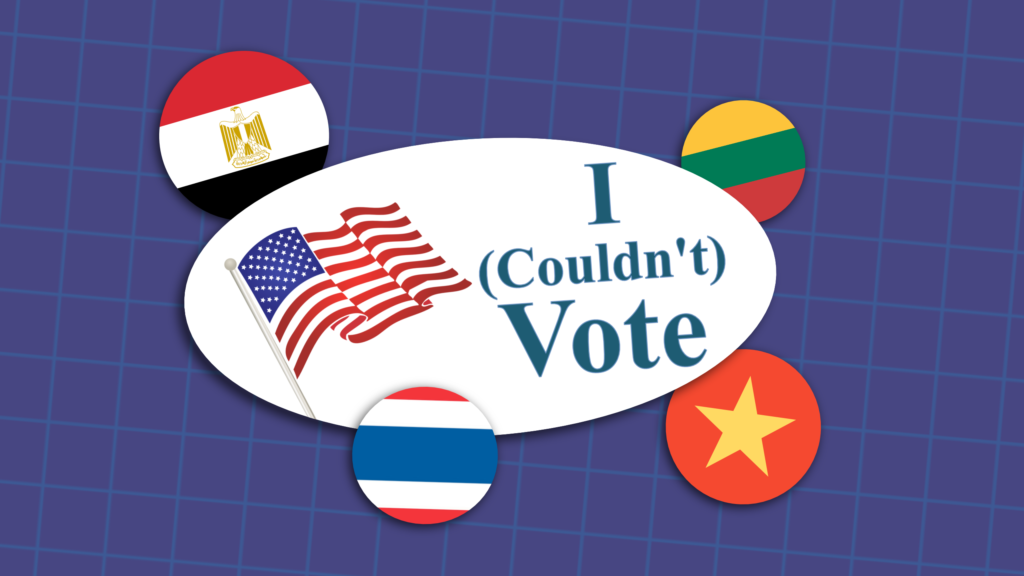International students at Grinnell approach caucus season from a unique perspective: they live in the center of current U.S. politics and their home countries are directly affected by the decisions of U.S. leadership. However, they are unable to caucus or vote due to their citizenship status. Yet, international students are heavily involved in the impending event–many participate in campaigns, attend town halls and think deeply about what candidates and policies are the best.
Charun Upara ’21, an international student from Thailand, expressed his excitement about the values represented by the caucuses in contrast to the conditions in his home country.
“I actually still feel really excited about this because I come from a country where we don’t have a fair democracy,” said Upara. Since undergoing a military coup in 2014, Thailand has been ruled by a military junta and is deemed “not free” by the civil liberties watchdog Freedom House.
Saule Keliauskaite ‘23, from Lithuania, outlined her direct stake in the U.S. presidential election: “I’m interested because I know decisions being made in the caucuses really impact me because the current administration is not positive about immigration and migrants.”
Mariyah Jahangiri ’20 is a first-generation immigrant from Pakistan who spent many years living abroad. She said that as a student with many international friends, she perceives a lot of interest in the current political landscape: “This is a huge presidential election and it impacts international students directly.”
Many international students voiced excitement about progressive candidates Bernie Sanders and Elizabeth Warren. Not surprisingly, U.S. foreign policy was at the center of their concerns.
“… Bernie has consistently critiqued the U.S. military and pushed for anti-imperialist policy whether it’s in Iraq, Afghanistan or Palestine. On a wide range of issues since the beginning of his career he has been anti-imperialist and this made him stand out,” said Jahangiri, who was previously involved with the Warren campaign and now supports Sanders.
Jahangiri also emphasized Sanders’ stance on domestic social issues as appealing to those who have often been excluded from U.S. politics, both in the U.S. and abroad. She said that the Sanders campaign has drawn in “people like me, people who are immigrants or people of color. Outside the U.S. there is also a lot of attention being paid to this election and to Bernie.”
Keliauskaite find both Warren and Joe Biden’s platforms compelling from a policy perspective but highlighted Warren’s plan to “take back” healthcare with her proposed implementation of Medicare for All as a positive.
“Back in Europe we have it all sorted out and I think that this could really work here too if the right people came to office,” she said.
When Keliauskaite attended Biden’s town hall, she focused on his foreign policy platform. She supported Biden’s hardline stance towards Russia, which shares a border with Lithuania through the Russian exclave of Kaliningrad, where the larger country has been strengthening their military presence.
Foreign policy and international concerns, however, have not been a major topic in the conversations at Grinnell College town halls or candidate visits.
“I do think there is room to speak more about international issues …” says Upara. “Being from Thailand, I would love to hear more about how the U.S. could cooperate with smaller countries.”
Keliauskaite had a similar perspective: “We really look for [the] United States’ support because we’re a really small country, so their [the U.S.’] say is literally what happens to us. If the U.S. doesn’t defend those who can’t defend themselves, it creates a power vacuum that other superpowers fill.”
Students also expressed frustration about their inability to vote in an election which takes up a significant portion of life in Iowa this primary season.
“As an international student you know that your voice doesn’t always change a lot even though you wish it would,” said Keliauskaite. “It’s harder to get involved. You can know about what’s going on but not necessarily change it.
“Even if I choose [a candidate] it’s not directly influential because I’m not a citizen,” stated Upara.
For Seif Emam ’22, from Egypt, the unique view of U.S. politics provided by the caucus scene in Grinnell reflects his “highly negative” view of the election cycle in general. “Most of the time I see a lot of people who are very biased towards one side,” Emam explained. “There is a cult of personality during the elections and lots of fights between supporters.”
Yet for Cat Ton ’22, from Vietnam, the caucuses show a “lively and interesting” aspect of political life in the U.S, even though Iowa as a state does not stand out in the international community.
Although international students cannot take to their chosen candidates’ corners on Monday night, the College caucus at Darby Gymnasium will have a viewing section for those not directly participating.
“We can observe,” said Upara. “I’m planning to.”




























































Elise Herner • Feb 2, 2020 at 12:51 pm
Very interesting article. Very interesting to think of the perspectives of students thrust in the middle of it all – yet not able to vote. I truly hope that students all over the country are made aware of this -and those who can vote -do !